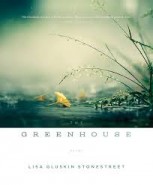
Book Review: The Greenhouse by Lisa Gluskin Stonestreet

The Greenhouse
Poems by Lisa Gluskin Stonestreet
Bull City Press, September 2014
ISBN-13: 978-1424318025
$14.00; 44pp.
Reviewed by Alyse Bensel
Whispering between chaos and silence, the poems in Lisa Gluskin Stonestreet’s chapbook The Greenhouse enact an elongated lyric, evoking the space inherent in waiting. Employing taut, long lines, these poems reveal the wonder at separation, at struggle, and the brief moments between. Winner of the 2014 Frost Place Chapbook Competition, The Greenhouse delivers these poignant impacts within the breadth of twelve poems.
Stonestreet utilizes the open field to navigate the relationship between mother and child: in the womb and after. In the after, the mother grapples with the idea that part of the child can still be a part of her, a condition termed microchimerism. In “Chimera,” the speaker initially implores “I want them out. I want / to be myself, my self / again.” And yet, this desire is complicated as the speaker turns back on herself, lending this inner struggle with a “Bright / tangle, snaking line / of fire.”
Years later, in “After Dropping My Son Off at Preschool,” the mother continues to reckon with this disentanglement. She likens herself to “a bubble, a greenhouse, a lens” who is now noticing a world coming back into existence. The pull between everyday luxuries and having time to write is made transparent, as the metaphor of greenhouse continues to surface, looming over the entirety of the poem. Interrupted by breaks, mimicking the time spent away from the page, the line and stanza serve to show the bursts of energy dedicated to the poem. Even when the speaker acknowledges, “I think this is where the metaphor breaks down,” she still motions toward the time to write after putting her son to bed.
That balance between slowing down for breath and the momentum of everyday living pervades. The manic form and blank spaces of “Dysnomia” leave empty spaces and gaps in memory, as the speaker even acknowledges in the writing of the poem “That was a typo, not my brain.” The mantra slow down appears, even as the imperatives “Mind the gap. / Leap the track” glare out at the poem’s end.
The struggle between stillness and motion, the everyday-ness of motherhood, maintains narrative and spatial tension throughout the chapbook. Stonestreet skillfully manipulates space to show this mental exertion, and all that it takes.
Alyse Bensel is the author of the chapbooks Not of Their Own Making (dancing girl press, 2014) and Shift (Plan B Press, 2012). Her poetry has most recently appeared or is forthcoming in Mid-American Review, Menacing Hedge, Heron Tree, and burntdistrict, among others. She serves as the Book Reviews Editor at The Los Angeles Review and Managing Editor of Beecher’s.
